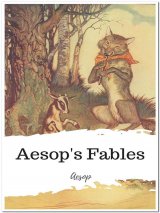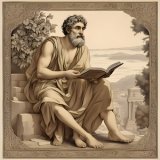Aesop's Fables Page #9
Aesop's Fables, or the Aesopica, is a collection of fables credited to Aesop, a slave and storyteller believed to have lived in ancient Greece between 620 and 564 BCE.
A Tortoise, discontented with his lowly life, and envious of the birds he saw disporting themselves in the air, begged an Eagle to teach him to fly. The Eagle protested that it was idle for him to try, as nature had not provided him with wings; but the Tortoise pressed him with entreaties and promises of treasure, insisting that it could only be a question of learning the craft of the air. So at length the Eagle consented to do the best he could for him, and picked him up in his talons. Soaring with him to a great height in the sky he then let him go, and the wretched Tortoise fell headlong and was dashed to pieces on a rock. THE KID ON THE HOUSETOP A Kid climbed up on to the roof of an outhouse, attracted by the grass and other things that grew in the thatch; and as he stood there browsing away, he caught sight of a Wolf passing below, and jeered at him because he couldn't reach him. The Wolf only looked up and said, "I hear you, my young friend; but it is not you who mock me, but the roof on which you are standing." THE FOX WITHOUT A TAIL A fox once fell into a trap, and after a struggle managed to get free, but with the loss of his brush. He was then so much ashamed of his appearance that he thought life was not worth living unless he could persuade the other Foxes to part with their tails also, and thus divert attention from his own loss. So he called a meeting of all the Foxes, and advised them to cut off their tails: "They're ugly things anyhow," he said, "and besides they're heavy, and it's tiresome to be always carrying them about with you." But one of the other Foxes said, "My friend, if you hadn't lost your own tail, you wouldn't be so keen on getting us to cut off ours." THE VAIN JACKDAW Jupiter announced that he intended to appoint a king over the birds, and named a day on which they were to appear before his throne, when he would select the most beautiful of them all to be their ruler. Wishing to look their best on the occasion they repaired to the banks of a stream, where they busied themselves in washing and preening their feathers. The Jackdaw was there along with the rest, and realised that, with his ugly plumage, he would have no chance of being chosen as he was: so he waited till they were all gone, and then picked up the most gaudy of the feathers they had dropped, and fastened them about his own body, with the result that he looked gayer than any of them. When the appointed day came, the birds assembled before Jupiter's throne; and, after passing them in review, he was about to make the Jackdaw king, when all the rest set upon the king-elect, stripped him of his borrowed plumes, and exposed him for the Jackdaw that he was. THE TRAVELLER AND HIS DOG A Traveller was about to start on a journey, and said to his Dog, who was stretching himself by the door, "Come, what are you yawning for? Hurry up and get ready: I mean you to go with me." But the Dog merely wagged his tail and said quietly, "I'm ready, master: it's you I'm waiting for." THE SHIPWRECKED MAN AND THE SEA A Shipwrecked Man cast up on the beach fell asleep after his struggle with the waves. When he woke up, he bitterly reproached the Sea for its treachery in enticing men with its smooth and smiling surface, and then, when they were well embarked, turning in fury upon them and sending both ship and sailors to destruction. The Sea arose in the form of a woman, and replied, "Lay not the blame on me, O sailor, but on the Winds. By nature I am as calm and safe as the land itself: but the Winds fall upon me with their gusts and gales, and lash me into a fury that is not natural to me." THE WILD BOAR AND THE FOX A Wild Boar was engaged in whetting his tusks upon the trunk of a tree in the forest when a Fox came by and, seeing what he was at, said to him, "Why are you doing that, pray? The huntsmen are not out to-day, and there are no other dangers at hand that I can see." "True, my friend," replied the Boar, "but the instant my life is in danger I shall need to use my tusks. There'll be no time to sharpen them then." MERCURY AND THE SCULPTOR Mercury was very anxious to know in what estimation he was held by mankind; so he disguised himself as a man and walked into a Sculptor's studio, where there were a number of statues finished and ready for sale. Seeing a statue of Jupiter among the rest, he inquired the price of it. "A crown," said the Sculptor. "Is that all?" said he, laughing; "and" (pointing to one of Juno) "how much is that one?" "That," was the reply, "is half a crown." "And how much might you be wanting for that one over there, now?" he continued, pointing to a statue of himself. "That one?" said the Sculptor; "Oh, I'll throw him in for nothing if you'll buy the other two." THE FAWN AND HIS MOTHER A Hind said to her Fawn, who was now well grown and strong, "My son, Nature has given you a powerful body and a stout pair of horns, and I can't think why you are such a coward as to run away from the hounds." Just then they both heard the sound of a pack in full cry, but at a considerable distance. "You stay where you are," said the Hind; "never mind me": and with that she ran off as fast as her legs could carry her. THE FOX AND THE LION A Fox who had never seen a Lion one day met one, and was so terrified at the sight of him that he was ready to die with fear. After a time he met him again, and was still rather frightened, but not nearly so much as he had been when he met him first. But when he saw him for the third time he was so far from being afraid that he went up to him and began to talk to him as if he had known him all his life. THE EAGLE AND HIS CAPTOR A Man once caught an Eagle, and after clipping his wings turned him loose among the fowls in his hen-house, where he moped in a corner, looking very dejected and forlorn. After a while his Captor was glad enough to sell him to a neighbour, who took him home and let his wings grow again. As soon as he had recovered the use of them, the Eagle flew out and caught a hare, which he brought home and presented to his benefactor. A fox observed this, and said to the Eagle, "Don't waste your gifts on him! Go and give them to the man who first caught you; make him your friend, and then perhaps he won't catch you and clip your wings a second time." THE BLACKSMITH AND HIS DOG A Blacksmith had a little Dog, which used to sleep when his master was at work, but was very wide awake indeed when it was time for meals. One day his master pretended to be disgusted at this, and when he had thrown him a bone as usual, he said, "What on earth is the good of a lazy cur like you? When I am hammering away at my anvil, you just curl up and go to sleep: but no sooner do I stop for a mouthful of food than you wake up and wag your tail to be fed." Those who will not work deserve to starve. THE STAG AT THE POOL A thirsty Stag went down to a pool to drink. As he bent over the surface he saw his own reflection in the water, and was struck with admiration for his fine spreading antlers, but at the same time he felt nothing but disgust for the weakness and slenderness of his legs. While he stood there looking at himself, he was seen and attacked by a Lion; but in the chase which ensued, he soon drew away from his pursuer, and kept his lead as long as the ground over which he ran was open and free of trees. But coming presently to a wood, he was caught by his antlers in the branches, and fell a victim to the teeth and claws of his enemy. "Woe is me!" he cried with his last breath; "I despised my legs, which might have saved my life: but I gloried in my horns, and they have proved my ruin."
Translation
Translate and read this book in other languages:
Select another language:
- - Select -
- 简体中文 (Chinese - Simplified)
- 繁體中文 (Chinese - Traditional)
- Español (Spanish)
- Esperanto (Esperanto)
- 日本語 (Japanese)
- Português (Portuguese)
- Deutsch (German)
- العربية (Arabic)
- Français (French)
- Русский (Russian)
- ಕನ್ನಡ (Kannada)
- 한국어 (Korean)
- עברית (Hebrew)
- Gaeilge (Irish)
- Українська (Ukrainian)
- اردو (Urdu)
- Magyar (Hungarian)
- मानक हिन्दी (Hindi)
- Indonesia (Indonesian)
- Italiano (Italian)
- தமிழ் (Tamil)
- Türkçe (Turkish)
- తెలుగు (Telugu)
- ภาษาไทย (Thai)
- Tiếng Việt (Vietnamese)
- Čeština (Czech)
- Polski (Polish)
- Bahasa Indonesia (Indonesian)
- Românește (Romanian)
- Nederlands (Dutch)
- Ελληνικά (Greek)
- Latinum (Latin)
- Svenska (Swedish)
- Dansk (Danish)
- Suomi (Finnish)
- فارسی (Persian)
- ייִדיש (Yiddish)
- հայերեն (Armenian)
- Norsk (Norwegian)
- English (English)
Citation
Use the citation below to add this book to your bibliography:
Style:MLAChicagoAPA
"Aesop's Fables Books." Literature.com. STANDS4 LLC, 2025. Web. 10 Jan. 2025. <https://www.literature.com/book/aesop%27s_fables_316>.




Discuss this Aesop's Fables book with the community:
Report Comment
We're doing our best to make sure our content is useful, accurate and safe.
If by any chance you spot an inappropriate comment while navigating through our website please use this form to let us know, and we'll take care of it shortly.
Attachment
You need to be logged in to favorite.
Log In